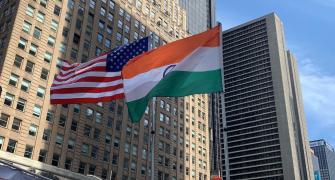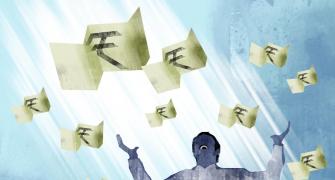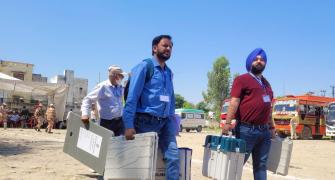One of the earliest professions of mankind, and the most necessary for survival, agriculture however has been getting the short end ever since Lal Bahadur Shastri's 'Jai Jawan Jai Kisan' was replaced by Mrs. Gandhi's 'Garibi Hatao' in the seventies of last century.
The Congress emphasis on poverty, in hindsight, made the Indian government a big brother for the farming community. The easiest way to improve living standards was to feed the masses; for that the government embarked upon a procurement policy for agricultural produce that necessarily kept competition away.
Agricultural exports to date have to be undertaken under a quota system. Thus the government till recently was the final and only authority on what the farmer could get for his labours.
However to keep its subsidy burden low, the government offer price was never enough to encourage better living for the millions of agriculturists and most importantly, a better infusion of capital into farming. So the government loaded them with freebies like free power, free access to irrigation, dirt-cheap chemical fertilizers and no income tax even if you were rolling in the stuff!!
So we now have poisoned water, power failures all over the country as power utilities are bleeding with the losses, a ground water table that has reached critical levels - meaning if the monsoons fail, we will have famines. By keeping incomes low for a majority of the people, despite all the other benefits, we find these policies have actually helped to keep India poor!
The entry of private players like ITC (under its e-Choupal scheme) and Cargill seeds has allowed the farmer to get a slightly better price (that is not linked to international prices at which these multinational giants would have had to source their needs) but to the lowly price the government offers to the farmers.
Price-conscious farmers also saw better handling of agricultural produce in the 'mandis' that reduced their wastages to bare minimum and this earned them a better realisation.
Low buffer stocks has the government now scrambling for wheat at international prices, for which India has paid 54% higher rates than what the Indian farmer got. The significantly higher subsidy has had the government reducing its demand by half to 511,000 tonnes.
Ways out?
If the government is no longer the only buyer, then it can be argued that it should be allowed to roll back all the subsidies it has been giving the agricultural sector. This will immediately:
- Reduce government wasteful expenditure and increase its tax income
- Allow better soil and water conservation efforts
- Most importantly better the stagnant productivity of Indian agriculture
- Also raise inflation rate
Even if we assume a 5% incidence of tax on agricultural incomes, by FY08 budget numbers, income tax collections will garner Rs 23,500 crore (Rs 235 billion) while stoppage of just food and fertilizer subsidy could yield another Rs 47,500 crore (Rs 475 billion) -- taking care of two thirds of India's revenue deficit of Rs 847 crore (Rs 847 billion).
Also power and water utilities would be in the black in this utopian world. The lower power tariffs should offset some of the general rise in prices for food products over a period of time. But will our political masters have the gumption for doing the right thing?
If ITC and Cargill are allowed to buy more produce than just wheat, then maybe there will be no way left but for them to follow the market path.
Powered by Equitymaster.com, an independent equity research initiative. Equitymaster is currently celebrating its 10th Anniversary. To know more about the special offers on its equity research subscription services, please click here.







